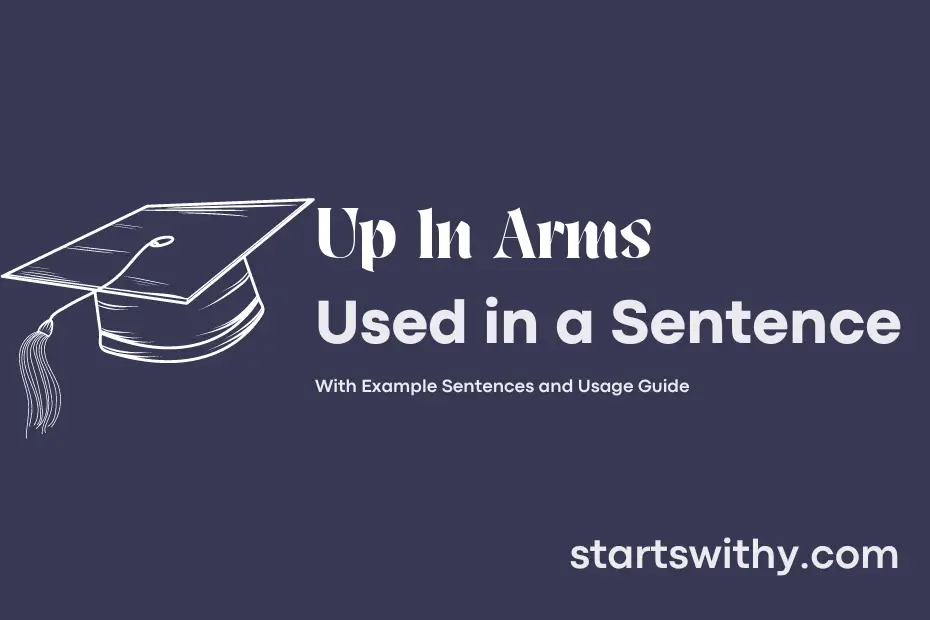When a group of people are greatly upset and outraged about something, you could say they are “up in arms.” This expression is used to describe a situation where individuals are extremely angry or agitated, often leading to heated debates or protests.
Whether it’s a controversial decision, a social issue, or a policy change, being “up in arms” signifies a collective sense of discontent and urgency to address the issue at hand. The phrase suggests a strong emotional reaction and a readiness to take action, making it a powerful way to convey intense displeasure.
7 Examples Of Up In Arms Used In a Sentence For Kids
- Up in arms means being very angry about something.
- When my friend took my toy without asking, I was up in arms.
- Everyone was up in arms when the teacher said we couldn’t have recess.
- The children were up in arms because they wanted more playtime.
- We were up in arms when the ice cream truck drove past our street without stopping.
- The students were up in arms when they found out there would be no story time today.
- I will be up in arms if someone tries to skip the snack time.
14 Sentences with Up In Arms Examples
- Up in arms because the exam schedule was changed without prior notice.
- The college students were up in arms about the sudden increase in hostel fees.
- Up in arms after finding out that the canteen prices had been hiked.
- The student union was up in arms over the lack of transparency in the college administration.
- The students were up in arms when they discovered that the library hours had been reduced.
- Up in arms over the strict dress code policy implemented by the college.
- The final year students were up in arms when they were told their project deadline had been moved up.
- The students were up in arms about the poor quality of food being served in the mess.
- The college athletes were up in arms when they found out their practice time had been cut short.
- The students were up in arms over the frequent electricity cuts in the college hostel.
- The science students were up in arms when they were informed about the cancellation of a crucial lab session.
- The students were up in arms over the unavailability of study material in the college library.
- Up in arms after the sudden cancellation of an important guest lecture.
- The students were up in arms about the lack of cleanliness and maintenance in the college bathrooms.
How To Use Up In Arms in Sentences?
To use “Up In Arms” in a sentence, you can follow these simple steps:
-
Understand the meaning of the phrase: Up In Arms means to be angry, agitated, or ready to fight about something.
-
Choose the appropriate context: Think of a situation where someone is extremely upset or outraged about a certain issue.
-
Construct your sentence: Incorporate the phrase Up In Arms into your sentence to convey a sense of anger or frustration. For example, “The community was up in arms about the proposed construction in the park.”
-
Pay attention to the correct placement: The phrase Up In Arms is typically used before or after the subject in a sentence to emphasize the intensity of the emotion.
-
Practice using the phrase: Try incorporating Up In Arms into different sentences to become more comfortable with its usage and nuances.
Remember, using Up In Arms in a sentence is a great way to express strong emotions or dissatisfaction about a particular issue. By following these steps and practicing, you can effectively incorporate this phrase into your daily communication.
Conclusion
In conclusion, “up in arms” is an idiom that conveys a state of anger or protest. It is often used to describe a situation where people are extremely upset or agitated about something. For example, “The community was up in arms over the proposed construction of the factory near their homes.” This phrase highlights strong emotions and a sense of mobilization or outrage among a group of individuals.
Whether it’s a reaction to perceived injustices, controversial decisions, or threatening changes, being up in arms signifies a collective display of discontent and a readiness to take action. By using this vivid expression, speakers can effectively communicate the intensity of emotions and the fervor of a group’s response to a particular issue.



